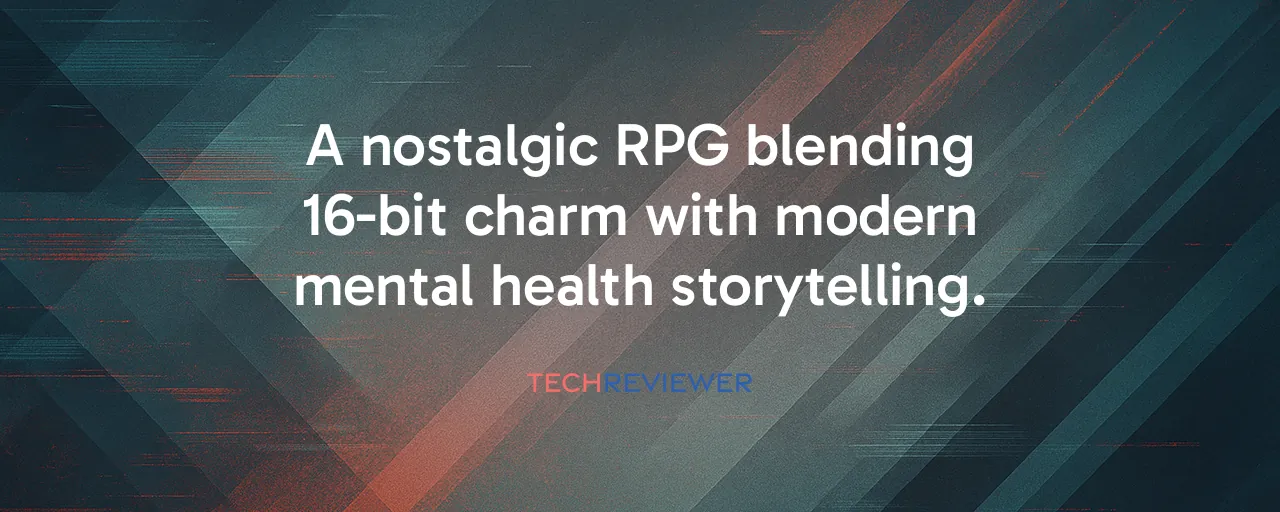A Nostalgic Journey With a Modern Heart
When you fire up Dreamed Away, set to launch on October 23, 2025, you're instantly hit with a wave of 16-bit nostalgia. Its pixel-art visuals and quirky humor scream Earthbound, the 1994 Nintendo classic that turned suburban life into a surreal adventure. Solo developer Nicolas Petton builds on retro vibes, adding deeper layers. His game, set in 1990s rural France, follows Théo, a boy grappling with his family's sudden disappearance. As he slips into dreamlike realms haunted by phantoms, the game weaves in themes of childhood anxiety and loss, presenting a psychological exploration alongside its homage to classic RPGs.
Dreamed Away stands out by refusing to stay in the past. While it borrows Earthbound's playful tone and modern-day setting, it layers in contemporary issues like mental health, handled with a subtlety that feels fresh. Petton, who is also the game's artist and composer, crafts a world where quirky characters and eerie dreamscapes coexist, pulling players into a story that is both familiar and unsettlingly new.
Combat That Keeps You on Your Toes
Dreamed Away's combat system is where things get really interesting. Petton blends traditional turn-based RPG mechanics with real-time mini-games, like dodging enemy attacks in a bullet-hell style. This hybrid approach, built on a custom C plus plus and SDL framework, keeps battles snappy and engaging, with input response times clocking in under 30 milliseconds, rivaling e-sports standards. The game's Steam demo, which players have clocked at 80-90 minutes, runs smoothly even on low-end PCs, proving Petton's technical chops.
The real magic happens with the 'dream-weaving' system. As Théo's anxiety meter shifts, the game dynamically alters level designs, enemy behaviors, and even music, creating a feedback loop that mirrors his emotional state. Players have praised this in early demos, noting how it makes every encounter feel personal. However, some worry the twitch-based combat might frustrate those who prefer slower, strategic battles, though adjustable difficulty sliders aim to ease that concern.
Learning From Indie RPG Successes
Dreamed Away isn't alone in its quest to blend nostalgia with emotional depth. Look at Undertale, released in 2015, which paired pixel-art charm with a story that tackled morality and choice. Its success, with millions of copies sold, showed players crave RPGs that hit deeper than dragons and dungeons. Similarly, Omori, launched in 2021, used its sunny aesthetic to mask a haunting exploration of trauma, resonating with players and sparking mental health discussions on platforms like Discord.
Both games prove there's a hungry audience for stories that feel personal. Dreamed Away builds on this, using its dream-weaving mechanics to make Théo's anxiety a core part of gameplay. Community feedback from demo players highlights how the game's themes encouraged them to open up about their own struggles, while streamer charity events have used it to raise funds for mental health causes. These case studies show indie RPGs can connect and heal, beyond just entertaining.
Balancing Nostalgia and New Ground
Petton's solo effort, backed by indie publisher Pineapple Works, faces a crowded market. Pixel-art RPGs are everywhere, and standing out takes more than retro charm. Dreamed Away's Kickstarter campaign and years of community buzz since 2022 have built a loyal following, but its psychological-horror elements might turn off younger players or those sensitive to themes of childhood trauma. Its likely Teen ESRB rating reflects this delicate balance.
Still, the game's compact 8- to 10-hour campaign and accessible design make it a strong contender. Modders are already tinkering with its Lua-based event hooks, hinting at a vibrant post-launch community. With plans for a 'Night-Terrace' DLC and even graphic novel potential, Dreamed Away could carve out a lasting niche, much like its indie predecessors.
Why This Matters for RPG Fans
Dreamed Away arrives at a time when players are craving stories that resonate. Its blend of Earthbound's whimsy with modern psychological depth offers a glimpse into where indie RPGs are headed. By tackling mental health without heavy-handed preaching, it invites players to reflect while still delivering a fun, fast-paced adventure. The game's ability to spark conversations, as seen in early community feedback, suggests it could leave a mark beyond its October release.
For those who grew up with Earthbound or fell in love with Undertale's heart, Dreamed Away feels like the next step. It's a reminder that small teams, even a single developer like Petton, can craft experiences that rival big-budget titles. As the game lands on PC and consoles, it's poised to show how nostalgia, when paired with bold ideas, can still surprise us.
